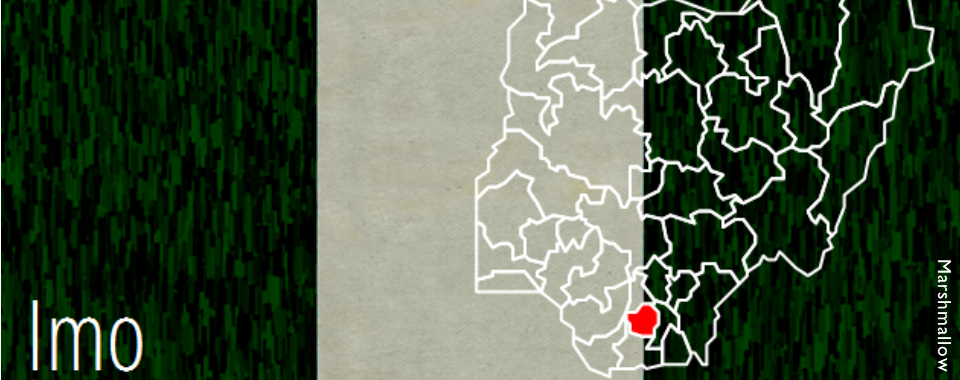BY PEACE AND SECURITY WORKING GROUP
Nigeria Election Scenarios and Recommendations
Disclaimer: The following analysis is based on discussions with State-level actors and so reflects their perceptions, not the view of the Peace and Security Working Group. These scenarios were produced prior to the 2014 primary elections and are thus subject to change. Where relevant, updates have been made to reflect evolving dynamics.
Imo At-a-Glance |
|
| Current Governor Rochas OkorochaCurrent Ruling Party All Progressives Congress (APC); formerly APGAKey February 2015 Elections Presidential Gubernatorial National Assembly State House of AssemblyPrognosis Imo State has been considered one of the most volatile states, placed in the highest threat level (red category) of CLEEN’s report. |
 |
| CLEEN Map of Hot Spots for Election Violence | |
 |
 |
| Peace Map (www.p4p-nigerdelta.org) | Violence Heat Map Jan 2009-Dec 2014 |
Elections in 2011
After incumbent Ikedi Ohakim (PDP) lost the political support of the voters, (esp. Catholic Church), Okorocha was able to narrowly defeat him in a major upset with 44.86% of the vote to Ohakim’s 38.68%. The ACN candidate came in third with 14.26%. Due to the closeness of the election, violence was elevated in Oguta, Isiala, Mbano, and Ideato South, including violent rallies, thuggery, and voter intimidation.
Ethnic Tension in 2011: Inasmuch as the state is predominantly Igbo (98%), there was no ethnic polarization. Women and girls were not particularly targeted.
Response: The Catholic Church played a major role in both mobilizing voters and calming the violence.
Key Political Developments Since 2011
Before 2011, PDP Governor Ikedi Ohakim lost public support because of perceived high-handedness (eg. the flogging of a parish priest), and mismanagement, giving room to an APGA candidate Rochas Okorocha to win the election, in a major upset. The Independent National Electoral Commission (INEC) initially declared the election inconclusive due to reports of irregularities. Since then, Okorocha dissolved the LG Councils, established and funded the Community Government Council (CGC), at the “Fourth Tier.” Okorocha began to lose support when he switched from APGA to APC, which is perceived to be a Yoruba/Hausa party, raising ethnic sentiment and historical grievances associated with the Biafran war. This opens up room for former political actors within the PDP to challenge Okorocha in 2015 (including Achike Udenwa, Ifeanyi Ararume, Chris Anyanwu, Mike Ahamba etc).
| Name | Position | Elected/ Appointed |
Party | Additional Information |
| Owelle Rochas Anayo Okorocha | State Governor | 2011 | APC | (1) |
| Eze Madumere | Deputy Governor | 2013 | APC | – |
| Chris N. D Anyanwu | Senator | 2007 | APGA | – |
| Hope Odidika Uzodinma | Senator | 2011 | PDP | – |
| Mathew I. Nwagwu | Senator | 2011 | PDP | – |
Additional Information:
(1) Governor Anayo Okorocha will run for re-election in 2015.
Elections in 2015
Driver of Conflict:
Hotly contested election; PDP has an opportunity to win back the state. Incumbent trying to hold it for APC.
Update: Deputy Speaker of Federal House of Representatives, Emeka Ihedioha, was declared the winner of the PDP Governorship primaries in Imo State in December 2014 although those results are (at the time of this writing) being contested. Senator Ifeanyi Ararume, who was said to have come second with 336 votes, contends there are errors in the computation of the results.
Proliferation of governorship aspirants
Dissatisfaction with incumbent among former supporters has led to suspected financial and political manipulation, or vote buying.
Mob and vigilante gangs easily mobilized for political violence and thuggery.
High unemployment rates make gangs an increasingly attractive option for youth, particularly during election cycles.
LGAs with Possible Election Violence:
Ohaji/Egbema
Oguta
Isiala-Mbano
Ihitte-Uboma
Okigwe
Ngor Okpala
Ahiazu-Mbaise
Possible Types of Violence:
Hijacking of voting materials
Violent rallies
Individual confrontations
Kidnapping
Arson
Political thuggery
2015 Election Possible Scenario
CLEEN Foundation’s threat assessment suggests that the election may be violent. Former governor Ohakim’s home was bombed in May 2014, although the motive and perpetrators remain unknown. Given Okorocha’s defection to APC, there is significant grievance among some in the political establishment which could lead to violence as the campaigning gets underway. The PDP, keen to retake the state, has been accused of funneling money and granting favors in an attempt to gain influence among disenfranchised Okorocha supporters. In addition, the existence of a significant youth population which remains unemployed or underemployed is believed to pose a threat as they may be easily mobilized to commit various acts of political violence and voter intimidation, which has happened in the past.
Before election:
Disruptive political rallies that may lead to violence and even deaths.
Political propaganda.
Voter intimidation.
During elections:
Hijacking of election materials.
Denial of voting rights.
Thuggery.
Kidnapping.
After elections:
Manipulation of election results.
Political party defections.
Tribunals and court cases.
These reports are a collaborative effort of The Fund for Peace and other members of the Nigeria Peace and Security Working Group (PSWG) in Nigeria. These reports reflect the result of a participatory process with national and local-level stakeholders on potential risk factors and scenarios for the February 2015 Nigeria general elections.
For more information, please contact:
Nate Haken at The Fund for Peace, nhaken@fundforpeace.org.
